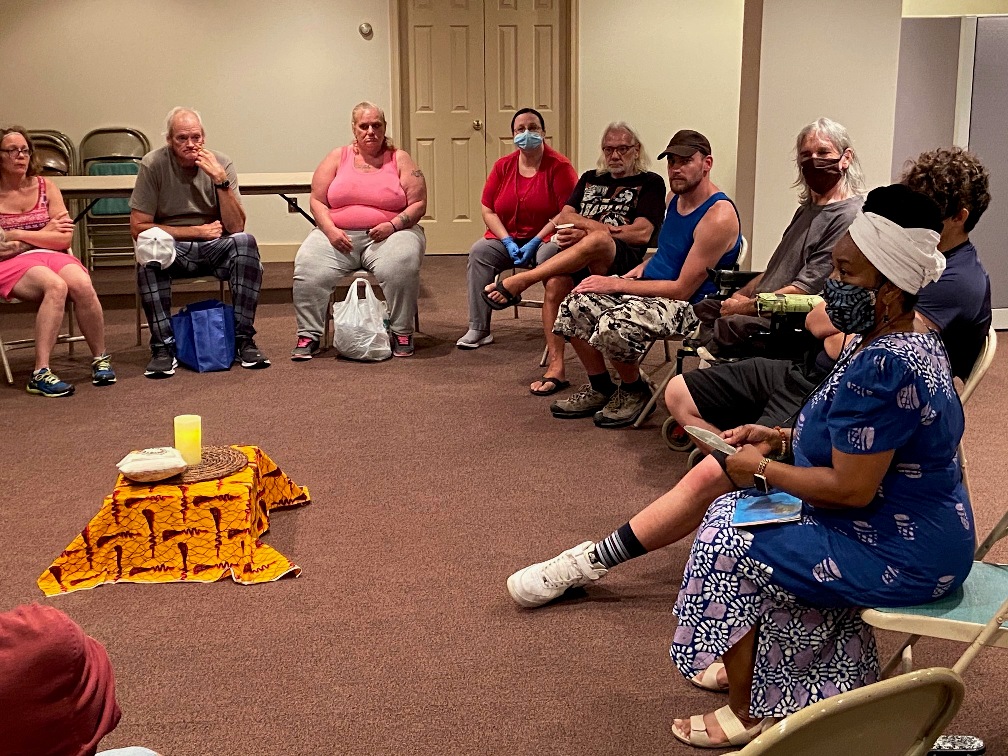by Danilo Sanchez, Conference Youth Formation Pastor
The reality of systemic racism has become evident with recent stories of Breonna Taylor, Ahmaud Arbery, and George Floyd. The week after protests and riots demanding justice erupted across the country, we noticed increased anxiety among our community members at Ripple Community Inc (RCI). Some did not understand why African Americans were so upset. Others happily shared about attending protests and what they witnessed. Some began to share stories of family members who were killed by the police or their fears of law enforcement. Ripple Church (Allentown, PA) and RCI began to respond to the collective anxiety bubbling to the surface. Immediately, we offered a safe place for people to process their emotions.

A recent conversation with Trent stood out for me. Trent came into the Community Center proudly wearing a shirt with nine historical Black figures. He was quizzing staff to see who knew the most. I knew seven of the nine. Trent was pleasantly surprised.
Then I decided to ask Trent a vulnerable question, “Hey man, how are you doing?”
There was a bit of silence and then a sigh from Trent, “You know what? Not great. I keep thinking to myself, that could have been me.”
That hit me hard. I knew he was right. I did not have any comforting words for Trent. I just sat there gazing into his eyes. I let the truth of his words seep into my bones.
I’ve had experiences with racism, but I’ve never been worried that the color of my skin could get me killed while out running or that police would enter my house without a warrant and start shooting. I do not want that to be Trent’s, or anyone’s, story.
Ripple Church and RCI took more action toward racial justice by hosting two events at RCI’s Community Building Center. The first event was with police officers as a way to build trust and ask them how they were addressing racial bias, police accountability, and excessive use of force.
The second event was a Listening Circle with Yvonne Platts from Norristown, PA. It allowed the community to listen to one another and for people of color to speak about their experiences with racism.
I was glad Trent was there for the Listening Circle. It would give him an opportunity to share and use his voice. As ground rules were explained, Trent fidgeted in his seat. He leaned over to Platts and said, “You know what, this isn’t for me. I can’t do this.” He got up and exited the circle.
I followed Trent to see what was going on. He confessed this was just too much for him. The pain of racism is real, and he was not ready to share his story. In my desire to empower Black voices, I overlooked Trent’s safety and emotional readiness to share, perhaps doing more harm than good. The rest of the Listening Circle was sacred, honest, and challenging. We plan to host another circle to educate the white members in our community about systemic racism.
I fight against white supremacy and racial injustice because God’s love demands it and they have caused deep wounds that need healing. Those wounds will not heal for the oppressed or the oppressor if we deny the reality of systemic racism in this country. There is much work to be done towards racial justice: repentance, prayer, listening, truth-telling, relinquishing power, learning, teaching. Find your part and join in the Spirit’s work.


 To not have history repeat itself it is important for both people of color and the white culture, to be intentional about inviting and retaining people of color. Hope for the Future allows space for discussion on how various things impact people in different ways. This year, discussions focused on what it means to be a peace church in consideration of the lived reality of people of color in this country, how to monitor and change when policies are being implemented inconsistently, and visioning for Hope for the Future.
To not have history repeat itself it is important for both people of color and the white culture, to be intentional about inviting and retaining people of color. Hope for the Future allows space for discussion on how various things impact people in different ways. This year, discussions focused on what it means to be a peace church in consideration of the lived reality of people of color in this country, how to monitor and change when policies are being implemented inconsistently, and visioning for Hope for the Future.


